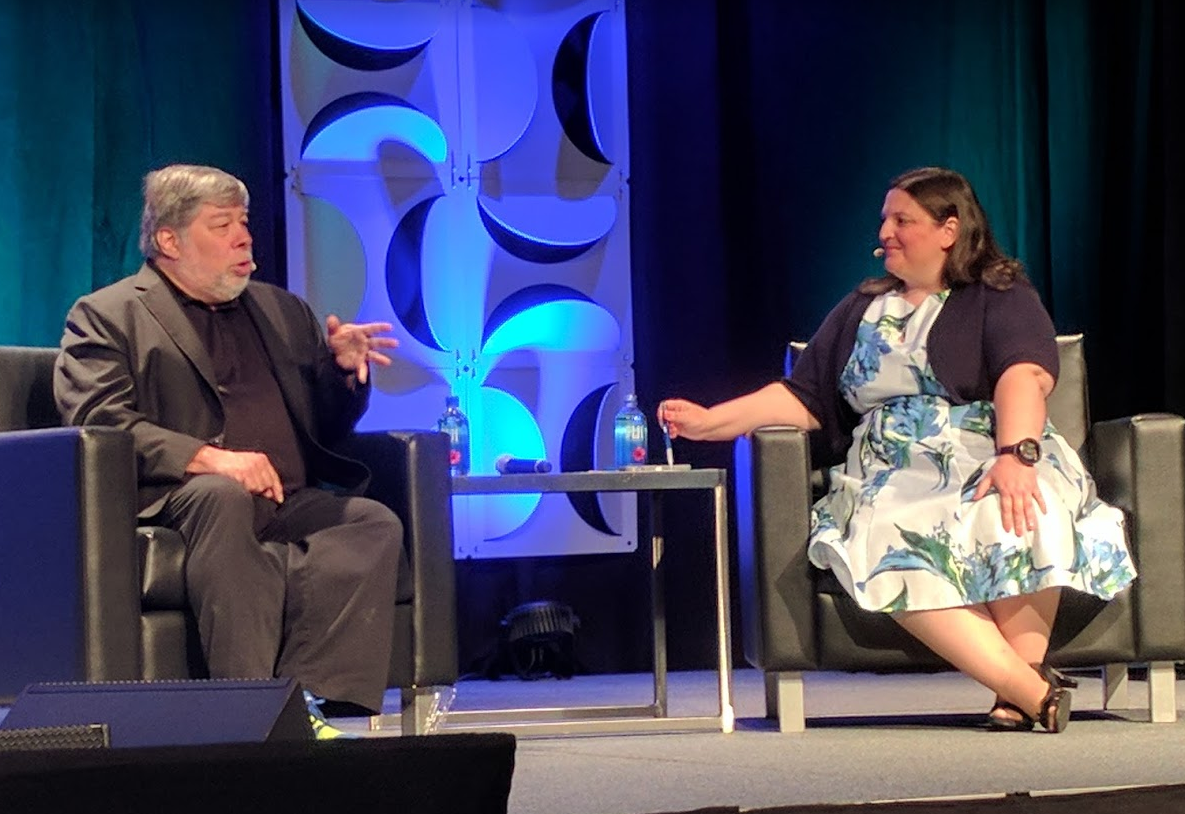By Max Teodorescu, Editor
Catching up with Steven Wozniak, Electronic Products attended this year’s 2017 Advanced Manufacturing Expo to hear the living legend of Silicon Valley present the key note address.
The massive event takes place from June 13–15 at the Jacob Javitz Convention Center and is comprised of six separate tradeshows: MDM East, Design & Manufacturing, ATX East, East Pack, Plastetc East, and Quality Expo.
Sharing anecdotes about his life, Wozniak offered young engineers advice on how to succeed where others failed and stressed the value of being an “engineer’s engineer” as he explored trends in robotics and automation, wearables, Big Data, and the Internet of Things.

Wozniak sitting with Suzanne Deffree, Design News Editor-in-Chief
Known as one of the original poster boys of Silicon Valley, many consider Wozniak among the fathers of personal computing with his creation of Apple’s first line of computers, the Apple I and II.
And like all Q&A’s with Steve Wozniak, the session on June 13 began with Apple and his relationship with Steve Jobs. “I would design something, and Steve would turn it into money,” mused Wozniak, referring to Jobs as the only other “friend” who could understand the scope of what he did. “Steve couldn’t design things, but he could analyze its value.”
“How did you manage to remain an engineer and not get sucked up into management?” asked Suzanne Deffree, Design News Editor-in-Chief, who moderated the discussion. Wozniak explained that building things was always important to him and that as an engineer, “I could continue turning out good ideas and never get fired [for] fighting over other people’s ideas.” That was delegated to the other Steve.
Where Jobs was the shrewd businessman, Wozniak prided himself as remaining “the engineer’s engineer,” for the surest way to understand a market and design something useful is to remain a part of the audience. “We were creating products for ourselves. When you’re creating products for yourself, you have a huge advantage over trying to imagine what other people want. The Apple II and iPhone were examples of this put into practice.”
Wozniak reverently pointed out Elon Musk as a recent example of his philosophy in action. “Elon Musk pushed the electric car concept into new territory, building the first successful full-sized electric car because he himself had a large family.” The two original Model S charging stations existed between Bel Air, where Musk lives, and the assembly plant in Fremont, California.
Now if you’ve ever heard Wozniak speak, you’ll know he’s a huge proponent of hands-on learning, particularly the learning of skills that enable creative expression. He himself learned to build computers because none existed outside of businesses and universities. “When I was young, I built things all the time. From when I was in elementary school, I’d study computer manuals and learn how they’re made because I couldn’t afford my own.”
At the time, Wozniak didn’t see the value of what he was learning but claims that he never experienced any obstacles in his life “because I just pursued what I really enjoyed.” The single-minded focus on structuring his life around doing what he loved, he shared, were the keys to his success. Wozniak believes the recent Maker movement exemplifies this philosophy.
“I love the maker movement because we started our company with a demonstrated prototype that worked. Like the makers of today, I’ve gone through my whole life making things for fun,” he explained, drawing a parallel between the design and construction of the Apple I — initially a hobby project — and makers who build things for sheer joy of it. By doing so, Wozniak insisted, makers are actually developing the skills that may eventually be used to create life changing tech.
“So if you were a millennial starting out, is there a field you’d be focused on?” asked Deffree. The last bit of advice that Wozniak left us with is universally applicable, millennial starting out or not: Above all else, do the thing that interests you and get your hands dirty. “If I were starting out, I’m pretty sure I’d be playing around with my Arduino, connecting to motors and making strange things under my control — not with the intent of starting a company, [but] just to do something creative.”
Today, that road has led Wozniak to the position of Chief Scientist at Primary Data, a software provider whose platform intelligently manages data storage systems by “matching data demands with storage supply across a single global data space,” as Chris Preimesberger of eWeek so elegantly put it.
But in the interim, Wozniak became a founding member of the non-profit digital rights group Electronic Frontier Foundation and has taken up philanthropy, donating much time and resources mentoring and teaching classes within the Los Gatos School District.
Advertisement
Learn more about Electronic Products Magazine





